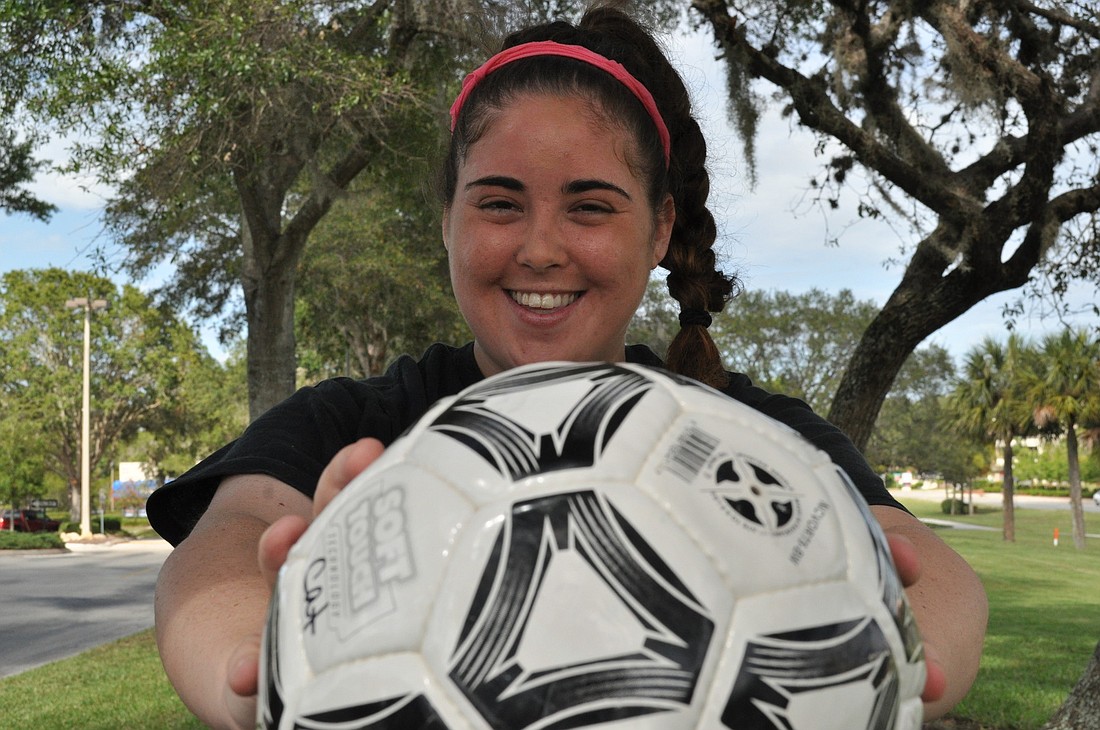- November 25, 2024
-
-
Loading

Loading

After devoting six years to playing competitive soccer, Cat Bradley made the varsity soccer team at Flagler Palm Coast High School at 16 years old. She also learned she would need a liver transplant.
About two weeks before her junior Homecoming dance, Bradley had routine blood work done. Two days later, the results showed she had 10 times the normal levels of liver enzymes. Initially, the doctors thought it was just a bad reading. But second and third tests confirmed the high levels.
Bradley visited a dozen doctors in Ormond Beach, Daytona Beach, Jacksonville and Gainesville. She was tested for Lyme disease, Crohn’s disease, diabetes — anything the doctors could think of — before being diagnosed with an autoimmune liver disease. Her immune system was attacking her liver cells.
“What she has is very serious,” said her father, Jim. “It’s a lifelong condition and it’s not going to go away just because she’s good and takes medicine. It’s part of the package.”
If her liver continues to deteriorate over time, Bradley would need to get a liver transplant — a worst-case scenario. But even that might not completely solve it.
Because of the disease, doctors put her on a high dose of steroids, which made her face “blow up like a puffer fish,” she said.
Bradley was reluctant to attend Homecoming, but she decided to go anyway. As she began to miss school, rumors swirled around school a few weeks later, and so Bradley finally decided to tell her soccer teammates what was wrong.
“People found out I was sick and it was one of those things where I didn’t want anyone to know, but I knew people needed to know,” she said. “I think I was scared to tell them because I didn’t want people judging me or people to feel sorry for me.”
The decision
Bradley continued to play high school soccer. Her senior year, she applied and was accepted to eight colleges.
But during her senior season, her parents began to notice she was lethargic after games and on the weekends when she wasn’t playing.
A doctor at Shands made a recommendation she didn’t want to hear: For her health, she should reconsider her dream of playing college soccer.
She finished her senior season, helping the Lady Bulldogs win their district and conference championships. They made it to the Elite 8 in the Class 6A state playoffs.
After graduating, Bradley and her parents decided she would forego playing college soccer. Bradley said it was the hardest decision of her life.
Bradley attended Jacksonville University in the fall of 2009. Her freshman year was a success in the classroom as she maintained a 4.0 grade point average and was selected for the Dean’s List each semester.
In the spring of her sophomore year, Bradley reached out to her former high school coach, Pete Hald. She needed an escape; she wanted to get involved in the sport she loves.
Bradley contacted Hald and asked if she could join the Lady Bulldogs coaching staff. Two seasons later, she is now a paid assistant.
“Soccer is definitely a way for Cat to get through her health issues,” Hald said. “It makes things better, gets her mind away from all of that. She is a hard worker and has made herself available to continue to grow as a coach.”
Smile on
In the fall, Bradley, 20, will be a senior at JU. She has two more years before she graduates with a master’s degree in elementary education and a double minor in business and marketing. Her mother, Charlotte, who is a third-grade teacher at Rymfire Elementary School, has been her inspiration to teach.
Despite commuting the past two years, coaching and training soccer and babysitting daily, Bradley was one of three students at JU who were selected to join the honors program for teaching.
When Bradley does have some down time, she’ll occasionally think about the harsh reality that she might need a liver transplant someday.
But there’s no point in worrying, she said.
“The little things don’t matter anymore — it’s more about the big picture,” she said. “I’ve been through a lot, but I don’t like people giving me pity. People always ask me how I’m so happy or why I’m smiling. I wouldn’t want to be upset or depressed every day. That’s not going to fix anything.”
And so, despite the obstacles, Cat Bradley will smile on. Much like she did before she was diagnosed.
“She always had a smile on her face,” Jim Bradley said. “By and large, she’s the same person now as she was before she was diagnosed. It’s just part of the deal that she got, and she’s made the most of it.”